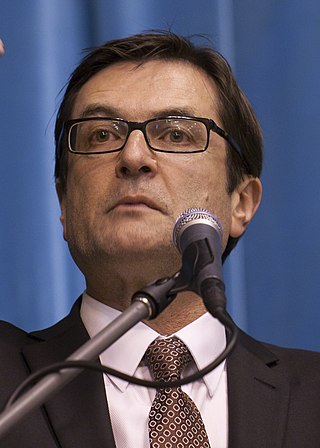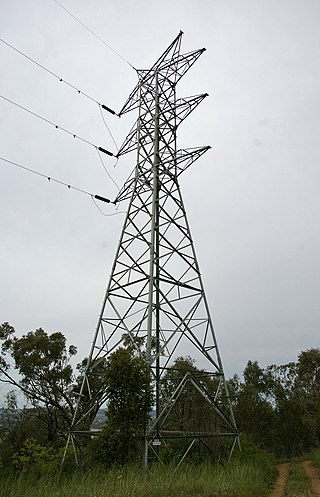
Martin John Ferguson is an Australian former Labor Party politician who was the Member of the House of Representatives for Batman from 1996 to 2013. He served as Minister for Resources and Energy and Minister for Tourism in the Rudd and Gillard governments from 2007 to 2013.
Leo Boyce McLeay is a former Australian politician who served as a Labor Party member of the House of Representatives from June 1979 to October 2004. He was Speaker of the House of Representatives 1989–93. During 1992 he was unsuccessfully censured by John Hewson, at the time Opposition Leader, with a motion of no confidence; Hewson accused McLeay of political bias.
Craig John Knowles is a former Australian politician and member of the New South Wales Legislative Assembly from 1990 to 2005.
Michael Rueben Egan was an Australian union official and politician, who served as Treasurer of New South Wales between 1995 and 2005. Egan served as the Chancellor of Macquarie University from 2008 until 2019 and sat on a number of government and non-government advisory boards.

Gregory Ivan Combet is the chairman of Australia’s sovereign wealth fund, the Future Fund. Prior to this he served as chair of the Australian Government Net Zero Economy Agency, overseeing the economic transformation from fossil fuels to renewable energy and net zero emissions.
Gabrielle Mary Harrison is a former Australian politician. She served as a Labor Party Member of the New South Wales Legislative Assembly from 1994 until 2003, representing the electorate of Parramatta. Harrison succeeded her first husband, Andrew Ziolkowski, who died in office.
Eric Michael Roozendaal, a former Australian politician, was a member of the New South Wales Legislative Council, serving between 2004 and 2013. He is a former General Secretary of the Labor Party. Roozendaal was the Treasurer of New South Wales, Minister of State and Regional Development, Minister of Ports and Waterways, Minister for the Illawarra, and Special Minister of State in the Rees and Keneally governments.

Andrew Arnold Tink AM is a former Australian politician, having served as a member of the New South Wales Legislative Assembly for the Liberal Party from 1988 to 2007. He was in the shadow cabinet from 1995 until March 2006. He has written two political biographies, a third book on the events and political consequences of a fatal plane crash, a fourth on Australian history, culture and society in the 20th century and a fifth on the involvement of Honeysuckle Creek Tracking Station in the first Moon landing. Since leaving politics, Tink has been appointed a visiting fellow and adjunct professor at Macquarie University, as a trustee of the Historic Houses Trust of New South Wales and president of the Library Council of New South Wales. He is an honorary Doctor of Letters honoris causa from Macquarie University.
Thomas Gregory Parry is an Australian economist and public servant from Sydney.
Mary Louise Easson is an Australian politician. She was an Australian Labor Party member of the Australian House of Representatives from 1993 to 1996, representing the Sydney-based electorate of Lowe.

The Electricity Commission of New South Wales, sometimes called Elcom, was a statutory authority responsible for electricity generation and its bulk transmission throughout New South Wales, Australia. The commission was established on 22 May 1950 by the Electricity Commission Act 1950 to take control of power generation in the State. The commission acquired the power stations and main transmission lines of the four major supply authorities: Southern Electricity Supply, Sydney County Council, the Department of Railways and the Electric Light and Power Supply Corporation Ltd, also known as the Balmain Electric Light Company, the owner and operator of Balmain Power Station. The commission was responsible for the centralised co-ordination of electricity generation and transmission in the State, and some local councils continued to be distributors of electricity only.
Captain Peter Edward James Collins, was the Leader of the Opposition in the New South Wales Legislative Assembly from 4 April 1995 to 8 December 1998.
Paul Howes was involved in the Australian trade union movement from 1999 through 2014. His most recent position was as National Secretary of the Australian Workers' Union, the youngest person to serve in that position. In 2008, Howes was elected as vice president of the Australian Council of Trade Unions, and he served on a number of Government boards.

The Public Service Association of NSW (PSA) is a union which covers employees in the government, university and related public sector in New South Wales. The union is registered under New South Wales state legislation and is affiliated with the Labor Council of New South Wales.

John Cameron "Robbo" Robertson is a former Australian politician who served as the leader of the Labor Party in New South Wales from 2011 to 2014. Before entering politics he was prominent in the union movement.
John Richard "Johno" Johnson GCSG was an Australian politician. He served as President of the New South Wales Legislative Council from 1978 to 1991.
Michael Alexander Williamson is an Australian former trade union official implicated in the Health Services Union of Australia (HSU) expenses scandal. In October 2013 Williamson pleaded guilty to two charges of fraud totaling nearly A$1 million, one charge of fabricating invoices and another charge of recruiting others to hinder a police investigation. The same day that he pleaded guilty, Williamson declared himself bankrupt. An earlier independent report commissioned by the union detailed that companies associated with Williamson and his family had allegedly fraudulently received more than $5 million from the union in period from 2006 to 2011. In the District Court of New South Wales in March 2014, Williamson was sentenced to seven–and–a–half years of imprisonment; with a non–parole period of five years.

Geoffrey Lee is a former Australian politician. He served as the Minister for Corrections in the second Perrottet ministry between December 2021 and March 2023. He has previously served as the Minister for Skills and Tertiary Education in the second Berejiklian and Perrottet ministries between April 2019 and December 2021. Lee was also a member of the New South Wales Legislative Assembly representing Parramatta for the Liberal Party since 2011 until his retirement in 2023.
An election for the leadership of the New South Wales branch of the Australian Labor Party was held between 7 and 29 June 2019. The election was triggered by the resignation of Leader Michael Daley on 25 March 2019. The election was a combined vote by the party membership and the Labor members of the Parliament of New South Wales, with each component weighted equally. The party members were sent their ballots on 7 June and had until 21 June to return them, while the parliamentary caucus met on 29 June to cast their votes.
Sarah Kaine is an Australian politician, academic and trade unionist. She was elected as a Member of the New South Wales Legislative Council at the 2023 state election.






